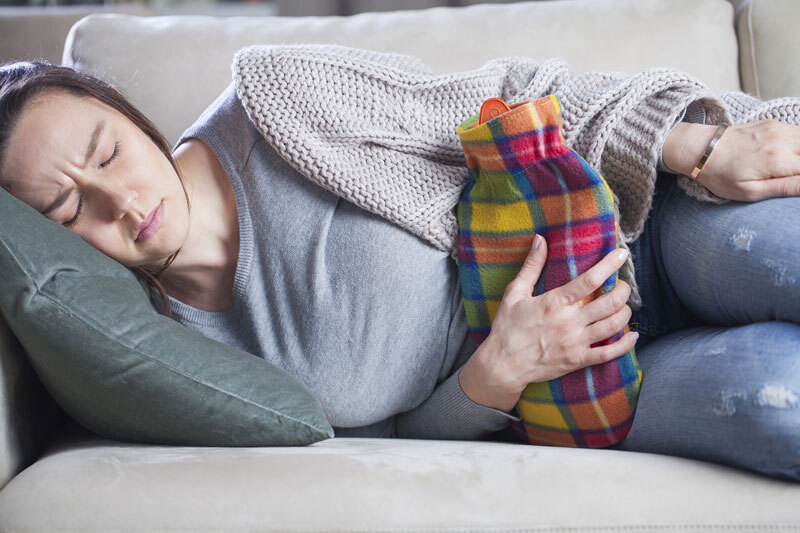Blowing through extra-large pads, super tampons, and underwear each period can be a lot to deal with. But that’s normal, right? Wrong.
At least 50 percent of women struggle with a heavy flow, and 1 in 6 women say it significantly impacts their quality of life. No one wants to be changing a tampon every other hour—and they shouldn’t have to either.
Heavy periods are common, but they are not normal. In this article, I’ll share some of the causes of heavy periods, how you can identify them and fix them for a lighter flow.
Do I Have a Heavy Period?
Normal blood loss is considered 30-80 mL or 1-6 tablespoons. Anything over 80 mL is considered heavy. But what does that look like?
- Your period lasts longer than 1 week
- You need to change your pads or tampons after 1 to 2 hours
- You double up on pads so you don’t soak through your clothes
- You need to use more than 6 pads or tampons per day/you soak through 2 pads or 2 tampons fully per day
- You have blood clots the size of a quarter or larger
- You are extremely sluggish and weak throughout the day, which can be a sign you have iron deficiency or anemia
Why Is My Period So Heavy? Causes of a Heavy Flow
High Estrogen Levels
Under the influence of estrogen, your uterine lining naturally builds up during the first half of your cycle. A heavy period may signify that this layer is building up too quickly and estrogen levels are too high. Excess estrogen may also cause mood swings, water retention, short cycles, breast tenderness, and menstrual migraines.
The Fix:
- Reduce exposure to endocrine-disrupting chemicals: this includes any water, cosmetics, body products, cleaning supplies, etc. that we use. A lot of conventional products on the market contain xenoestrogens that mimic naturally occurring estrogen. Studies have linked exposure to xenoestrogens with menstrual cycle issues.
- Build gut health: When our microbiome is out of balance, the bacteria that are supposed to eliminate estrogen don’t get to do their jobs. Check out our post on probiotics to learn more about how to get a healthy microbiome.
Not Ovulating
Around mid-cycle, we ovulate and release an egg from one of our ovaries. If you’re not ovulating, that means that you could be experiencing cycles that are more than 35 days apart. Other symptoms may be no fertile-type cervical mucus (stretchy, egg white appearance), seep problems 1-2 weeks before your period, and problems conceiving.
Another common cause is PCOS as most women with PCOS don’t ovulate regularly or at all. Symptoms of PCOS include irregular cycles, skin tags, hair loss, darkened skin around armpits, groan, neck, and difficulty losing weight.
Other reasons for skipped ovulation can be stress, low body weight, missing nutrients, and poor sleep.
Other Potential Causes
Other causes can include endometriosis, uterine fibroids, inherited bleeding disorders, and cervical and endometrial cancers. The last two are least common but can be possible. Underlying factors and conditions can include diabetes, menopause, pelvic inflammatory disease, IUDs, the pill, anti-clotting medications, and even certain types of chemotherapy.
How to Lighten Your Period
First, you need to tune in with your body, track your period to understand what’s normal for you, and then assess your condition. If you are new to heavy periods and are also experiencing pain, fever, smelly discharge, see your medical provider and rule out more serious conditions. Heavy periods are often commonly mistaken for miscarriages, so check with your medical provider for that as well if you think there may have been a chance you were pregnant.
If you have low mood, energy, or difficulty focusing during your moon cycle, consider getting checked for iron deficiency anemia. Getting your iron levels up can really help.
Reduce Excess Estrogen and Exposure to Endocrine Disruptors
- Swap out conventional cosmetics for green and clean cosmetics
- Swap out conventional tampons for organic cotton tampons with no fragrance, or try a cup/organic cotton liners or period underwear.
Diet
- Reduce food sources of estrogen, including excess meat consumption (especially red)
- Bring more fish in
- Increase intake of lentils and beans
- Include broccoli, cabbages, kale, cauliflower, brussel sprouts, leafy greens, and fruits in your diet
- Add fermented food like kimchi, coconut yogurt, and more to support gut health
Support Ovulation
One of the causes of a heavy period, as we’ve learned, can be no ovulation. Focus on these tips to help support ovulation:
- Consume flax seeds right before you are supposed to ovulate
- Increase intake of vitamin c through broccoli, kiwi, peppers, strawberries, brussels sprouts
- Consume maitake mushrooms in whole food form or powder (50 mg/day of extract)
- Get good quality sleep, go to bed at the same time every night
- Connect with girlfriends to help progesterone levels increase
Herbs for Heavy Bleeding
- Yarrow tea is amazing to drink right before your period starts and continue for the first two days
- Ginger root tea: consume during your period
Remember, you know your body better than anyone else. Checking in with yourself to see how you can nourish and replenish is key to a healthy cycle. Check out the articles below for more support:
- Irregular Periods? Here are Natural Ways to Regulate Your Cycle
- Menstrual Cycle: Scheduling Your Home & Work Life Around Your Period
- The Relationship Between Your Blood Sugar Levels & Menstrual Cycle Troubles
- Embracing Your Divine Feminine For Mind, Body, Spirit Health
Sources
- https://avivaromm.com/heavy-periods/
- https://www.jessicaashwellness.com/blog-2/heavy-periods-what-you-need-to-know
- https://health.clevelandclinic.org/women-why-you-shouldnt-ignore-a-heavy-period/





READ the Latest
Health Habits
Longevity
Health Habits
Health Habits
One Comment